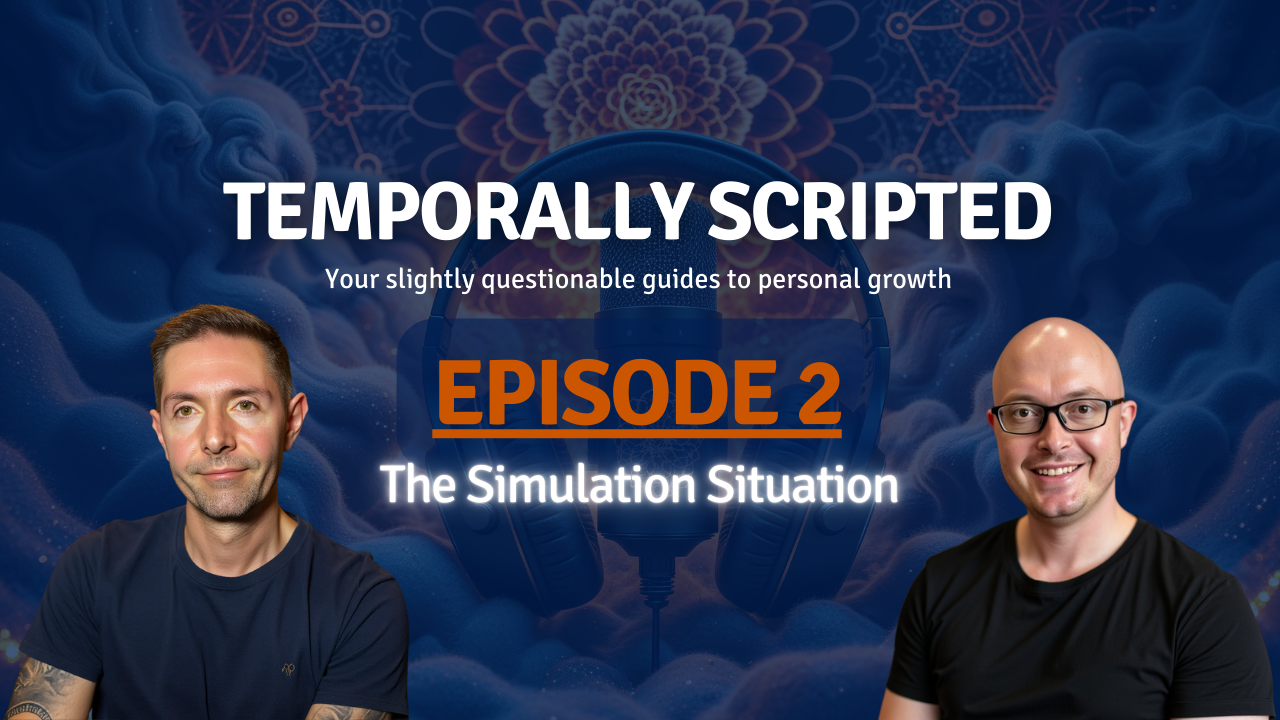In this mind-bending episode, Jack and Adam dive headfirst into the rabbit hole of simulation theory.
From Elon Musk’s bold claims to ancient civilisations, they explore whether our reality might just be an elaborate computer program – and whether it even matters if it is.
Key Takeaways
- The simulation argument suggests we’re living in a computer-generated reality
- Ancient civilisations might have been more technologically advanced than we think
- Our perception of reality is inherently subjective and possibly unreliable
- Whether we’re in a simulation or not, our experiences and relationships still matter
- Love and human connection might be the “cheat code” to playing the game of life
Notable Quotes
Jack: “When you start to think about whether you’re the only real person… that genuinely makes me feel uneasy. It’s like pulling on that thread in a jumper and it just keeps coming out and you’re like, ‘Oh no, I wish I’d not started pulling on this thread.'” [00:26:00]
Adam: “How do you know what cold is if you don’t know what hot is? How do you know what complete feelings of happiness are unless you’ve had feelings of absolute sadness and loss?” [00:34:00]
Jack: “I personally believe that the purpose of the game, the simulation, the universe, whatever, is love basically, and what we’re here to do is to love and to experience that feeling.” [00:33:00]
Adam: “We only see a very small part of the whole spectrum of light. We don’t have cryptochrones like some animals that can see the magnetic poles… we’re only thinking generally in how it looks or sounds to our senses.” [00:38:00]
Jack: “The same with the ancient Egypt thing as well, it’s usually civilisations get more technologically advanced over time, but with ancient Egypt, it seems like all of the good stuff was done at the start and it just generally went downhill from there.” [00:13:00]
Adam: “It’s like that thing, isn’t it, in the playground when you’re five… Maybe that’s not accurate. I should fact check myself.” [00:39:00]
Key Discussion Points
The Science Behind Simulation Theory
- Google’s quantum computing breakthrough
- Nick Bostrom’s simulation argument
- The role of consciousness and perception
- Technological advancement and computing power
- Universal constants and patterns in nature
Ancient Mysteries & Technology
- Egyptian pyramid construction mysteries
- Evidence of lost advanced civilisations
- The decline of ancient technological capabilities
- Unexplained precise measurements and craftsmanship
- Historical anomalies that challenge our understanding
Reality vs Perception
- The nature of déjà vu experiences
- Mandela Effect and collective false memories
- The unreliability of human memory
- Observer effect in quantum mechanics
- Limitations of human sensory perception
Philosophical Implications
- Parallels between simulation theory and religion
- The nature of consciousness and reality
- Impact on personal meaning and purpose
- Role of love and human connection
- Whether the truth even matters
Modern Entertainment & Society
- Video game evolution and virtual reality
- Netflix’s dark content trends
- Society’s fascination with violence
- The impact of technology on human experience
- Future implications of the metaverse
Timestamps
00:00:00 – Show introduction and simulation theory overview
00:02:00 – Discussion of Elon Musk’s simulation probability claims
00:04:00 – Google’s quantum computing breakthrough
00:09:00 – Ancient civilisations and technological mysteries
00:14:00 – Simulation creation and entertainment
00:17:00 – Alan Watts and dream theory
00:20:00 – Déjà vu experiences and reality glitches
00:26:00 – Personal experiences with psychedelics and reality
00:31:00 – Love as the purpose of existence
00:35:00 – Universal constants and patterns
00:38:00 – Infinity and human perception
00:42:00 – Netflix culture and violence in media
00:47:00 – Philosophical implications of simulation theory
00:51:00 – Episode wrap-up and next week’s preview












